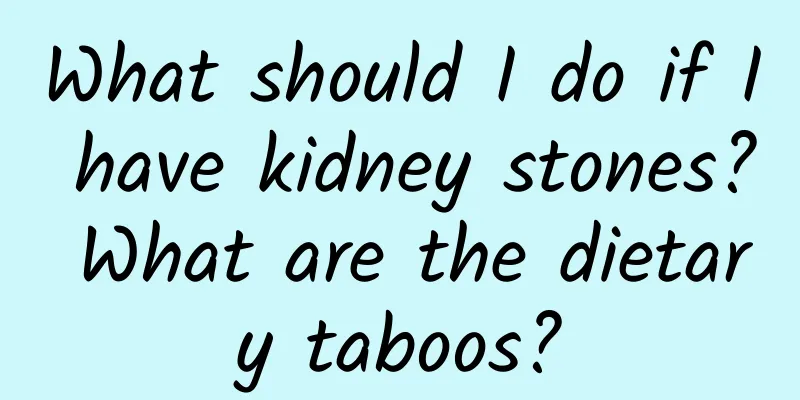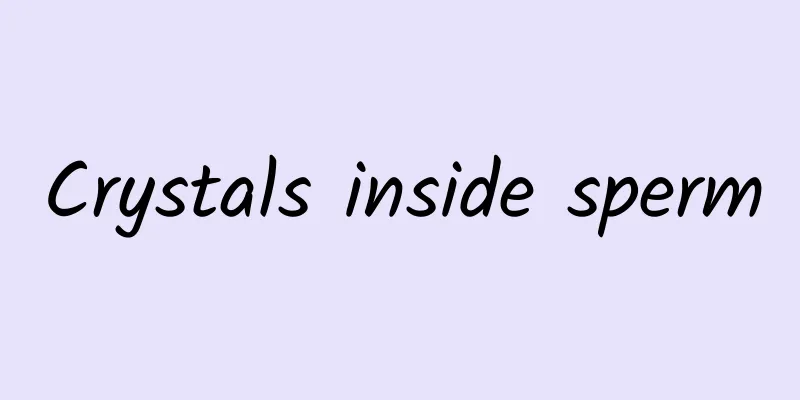What should I do if I have kidney stones? What are the dietary taboos?

|
The kidney is an important organ of the human body. Minor kidney stones can be treated through diet. Mild kidney stones can be treated without surgery, but more serious kidney stones require surgery! What should I do if I have a kidney stone constitution? There are many treatments for kidney stones, and the hospital needs to choose the right one based on the specific location and size of the stones. Treatments such as medication, lithotripsy, and surgery can all achieve a cure. 1. Preventing and controlling the formation and recurrence of stones 1. Remove the causes of kidney stones and actively treat the causes of stone formation, such as removing the parathyroid glands for primary hyperparathyroidism, treating malignant tumors, controlling renal pelvic infection and relieving urinary tract obstruction, which are all effective measures to prevent stone formation and recurrence. 2. General treatment (1) Ensure adequate drinking of water: It is best to drink magnetized water with low mineral content, so that the daily urine volume exceeds 2000ml, which can dilute urine, reduce crystal precipitation, flush the urinary tract and expel tiny stones. (2) Diet: The composition of the diet should be determined according to the type of stones and the acidity and alkalinity of urine. For calcium oxalate stones, high-oxalate foods such as spinach, tomatoes, potatoes, beets, asparagus, nuts, tea, cocoa, chocolate, etc. should be avoided. And foods high in calcium such as milk, cheese, etc. For idiopathic hypercalciuria, calcium intake should be restricted to reduce urinary calcium content; for recurrent oxalate stones without hypercalciuria, a low-calcium diet is not required. A low-calcium diet is also not recommended for people who form stones due to increased urinary oxalic acid excretion. Control sodium intake. Excessive sodium intake can increase urinary calcium excretion. In cases of hyperuricemia and hyperuricosuria, one should eat a purine diet, avoid eating animal offal, and eat less fish and coffee. 3. Medication (1) Hypercalciuria: Hypercalciuria caused by primary hyperparathyroidism, sarcoidosis, hyperthyroidism, multiple myeloma, etc. should be treated accordingly. For other causes, the following measures can be taken. 1) Thiazide diuretics: 50-100 mg of hydrochlorothiazide per day, or other diuretics of corresponding doses. 2) Sodium phosphate fiber resin: 2.5-5g each time, take with meals. At the same time, oxalic acid intake should be appropriately limited and calcium should be supplemented. 3) Orthophosphate: 1.5-2.0g of phosphorus per day, taken in 3-4 times. It is not used in patients with a glomerular filtration rate below 30 ml/min and those with urinary tract infections because it may cause metastatic soft tissue calcification and infectious stones. (2) Enteric hyperoxaluria: magnesium hydroxide or magnesium oxide can be used. Cholestyramine can correct intestinal fat malabsorption but cannot continuously inhibit oxalate absorption. (3) Hypouric citrate calcium kidney stones: 3-6 g per day, divided into three doses. Some patients may experience mild gastrointestinal reactions, and patients with renal insufficiency should use it with caution. (4) Uric acid stones: Potassium citrate is the first choice in clinical practice, with a dose of 30 to 60 mmol/d. If blood uric acid level is elevated at the same time, allopurinol should be taken additionally, and the maintenance dose can be changed after the blood uric acid concentration is controlled. (5) Cystinuria and cystine stones: When adequate water intake (usually > 3 L/d) and alkaline urine (pH > 7.5) are ineffective, D-penicillamine can be used for treatment, 1 to 2 g per day, taken in divided doses. The mechanism of action of α-mercaptopropyleneglycine is similar to that of D-penicillamine, but with fewer side effects. (6) Infectious stones: Long-term and effective control of urinary tract infections can limit the formation of infectious stones and even dissolve some existing stones. However, due to the low concentration of antibiotics in the stones, the bacteria cannot be completely killed, so it is difficult to completely cure urinary tract infection with antibacterial treatment alone. (II) Treatment of stones The treatment of kidney stones has made great progress in recent years. Many kidney stones that required surgical treatment in the past can now be removed through extracorporeal shock wave lithotripsy or non-open surgery, or a combination of several methods to achieve satisfactory results. Medical treatment can be used for smooth round stones with a diameter of less than 0.5 mm, without urinary tract obstruction or infection, and with good renal function. Litholytic therapy is more effective for uric acid stones and cystine stones, but less effective for calcium stones and infectious stones. The routes of administration include oral, intravenous, ureteral catheterization, open nephrostomy catheterization, and percutaneous nephrostomy catheterization. During treatment, the patient's condition should be closely monitored, and radionuclide renal scans and X-ray examinations should be performed regularly to understand renal function and decide whether to undergo surgery. (III) Symptomatic treatment 1. Renal colic can be treated with antispasmodics such as atropine or 654-2 injected intramuscularly. Promethazine can be used in combination to enhance the efficacy. If ineffective, pethidine or morphine can be used. 2.For treatment of urinary tract infection, see "Urinary Tract Infection". What can't you eat if you have kidney stones? 1. What vegetables can’t be eaten for kidney stones? 1. Patients with kidney stones should limit the amount of foods rich in oxalic acid. 2. You cannot eat vegetables from the vegetable family such as beans, beets, celery, green peppers, coriander, and spinach. 2. What fruits can’t be eaten for kidney stones? 1. Do not eat fruits and dried goods rich in oxalate, including grapes, dried figs, stone fruits, etc. 2. Do not eat apples (they are acidic fruits, so eat them in moderation and not too much). 3. What beverages should not be consumed by patients with kidney stones? 1. Drink less high-calcium and high-protein beverages (milk, soy milk). 2. Drink less alcohol. Drinking too much can easily induce kidney stones. Drinking alcohol interferes with a series of metabolism in the body and the acidity and alkalinity of the internal environment, increasing the chance of developing stones. 4. What meat dishes can’t be eaten by patients with kidney stones? 1. Patients with kidney stones should try not to eat beef, mutton, etc. during treatment. 2. Limit the intake of other meats, especially animal offal. What to eat for kidney stones? 1. What vegetables are good for kidney stones? 1. Patients with this disease should eat a light, low-protein, low-fat diet. 2. The diet should be diversified and rich in nutrients and vitamins, such as fresh vegetables and cucumbers. 3. Eat black fungus in moderation. 2. What fruits are good for kidney stones? 1. Fruits rich in vitamin B1 are good for dissolving kidney stones, so you can eat more of them (oranges, red dates, bananas, watermelons, apples, persimmons). 2. Fruits containing vitamin C are also good for dissolving kidney stones (kiwi, orange). 3. What meat dishes are good for kidney stones? 1. A major cause of kidney stones is excessive fat intake. Meat from various animals, especially fatty pork, are foods high in fat. Therefore, patients with kidney stones should try to eat less meat. 4. What beverages are good for kidney stones? 1. Drink less high-calcium and high-protein beverages (milk, soy milk). 2. Drink less alcohol. Drinking too much can easily induce kidney stones. 3. Drink boiled water in moderation according to your condition. |
<<: What exactly is the often-mentioned positive constitution?
Recommend
How long will it take for the baby to be born if it is head down?
When the fetus is head down, it usually means tha...
Can gastrointestinal stromal tumors be cured?
Gastrointestinal stromal tumors are tumors in the...
What to do if your six-month-old baby has torticollis
Many families will hire a confinement nanny to he...
What causes chest tightness and shortness of breath when angry? How to relieve it?
In daily life, people are prone to experience sym...
Chinese medicine distinguishes the true and false of internal heat
Traditional Chinese medicine divides "fire&q...
Colonoscopy polyp surgery recipes
Polyps can appear in many parts of the body, such...
Symptoms of spleen and stomach deficiency
As a member of the human digestive system, the sp...
What to do if your child has recurring eczema
If you have children at home, you should pay spec...
Have you ever tried making Maca wine? Can you soak?
Maca wine-making can make the effective ingredien...
Pain under breast during breastfeeding?
Women who are breastfeeding need to take better c...
Menstruation lasts more than 7 days
If your period lasts for more than seven days, it...
Cryotherapy for hair loss
People often see men without hair, and they are b...
What are kidneys used for?
Kidneys are important organs in our body, but wha...
What should I do if my second molar falls out?
When the second molar is missing, there are many ...
What are the symptoms of uncooked beans poisoning?
Some netizens asked if beans are poisonous if the...









